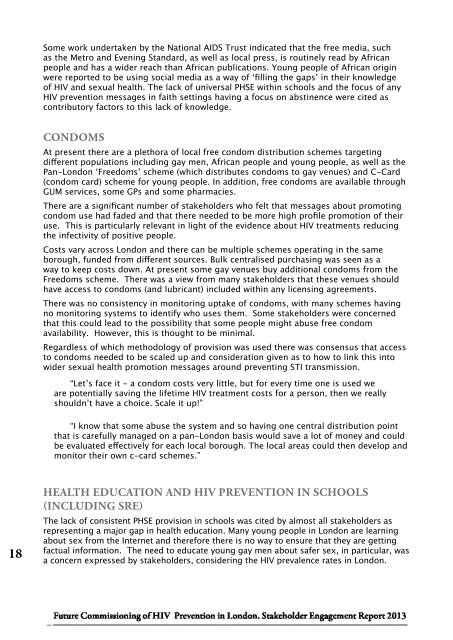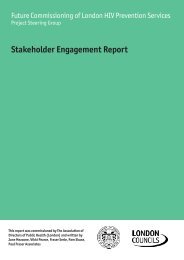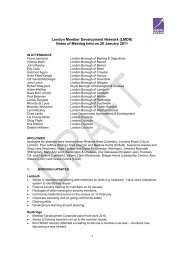Stakeholder Engagement Report - London Councils
Stakeholder Engagement Report - London Councils
Stakeholder Engagement Report - London Councils
You also want an ePaper? Increase the reach of your titles
YUMPU automatically turns print PDFs into web optimized ePapers that Google loves.
Some work undertaken by the National AIDS Trust indicated that the free media, such<br />
as the Metro and Evening Standard, as well as local press, is routinely read by African<br />
people and has a wider reach than African publications. Young people of African origin<br />
were reported to be using social media as a way of ‘filling the gaps’ in their knowledge<br />
of HIV and sexual health. The lack of universal PHSE within schools and the focus of any<br />
HIV prevention messages in faith settings having a focus on abstinence were cited as<br />
contributory factors to this lack of knowledge.<br />
Condoms<br />
At present there are a plethora of local free condom distribution schemes targeting<br />
different populations including gay men, African people and young people, as well as the<br />
Pan-<strong>London</strong> ‘Freedoms’ scheme (which distributes condoms to gay venues) and C-Card<br />
(condom card) scheme for young people. In addition, free condoms are available through<br />
GUM services, some GPs and some pharmacies.<br />
There are a significant number of stakeholders who felt that messages about promoting<br />
condom use had faded and that there needed to be more high profile promotion of their<br />
use. This is particularly relevant in light of the evidence about HIV treatments reducing<br />
the infectivity of positive people.<br />
Costs vary across <strong>London</strong> and there can be multiple schemes operating in the same<br />
borough, funded from different sources. Bulk centralised purchasing was seen as a<br />
way to keep costs down. At present some gay venues buy additional condoms from the<br />
Freedoms scheme. There was a view from many stakeholders that these venues should<br />
have access to condoms (and lubricant) included within any licensing agreements.<br />
There was no consistency in monitoring uptake of condoms, with many schemes having<br />
no monitoring systems to identify who uses them. Some stakeholders were concerned<br />
that this could lead to the possibility that some people might abuse free condom<br />
availability. However, this is thought to be minimal.<br />
Regardless of which methodology of provision was used there was consensus that access<br />
to condoms needed to be scaled up and consideration given as to how to link this into<br />
wider sexual health promotion messages around preventing STI transmission.<br />
“Let’s face it - a condom costs very little, but for every time one is used we<br />
are potentially saving the lifetime HIV treatment costs for a person, then we really<br />
shouldn’t have a choice. Scale it up!”<br />
“I know that some abuse the system and so having one central distribution point<br />
that is carefully managed on a pan-<strong>London</strong> basis would save a lot of money and could<br />
be evaluated effectively for each local borough. The local areas could then develop and<br />
monitor their own c-card schemes.”<br />
18<br />
Health Education and HIV Prevention in Schools<br />
(including SRE)<br />
The lack of consistent PHSE provision in schools was cited by almost all stakeholders as<br />
representing a major gap in health education. Many young people in <strong>London</strong> are learning<br />
about sex from the Internet and therefore there is no way to ensure that they are getting<br />
factual information. The need to educate young gay men about safer sex, in particular, was<br />
a concern expressed by stakeholders, considering the HIV prevalence rates in <strong>London</strong>.




